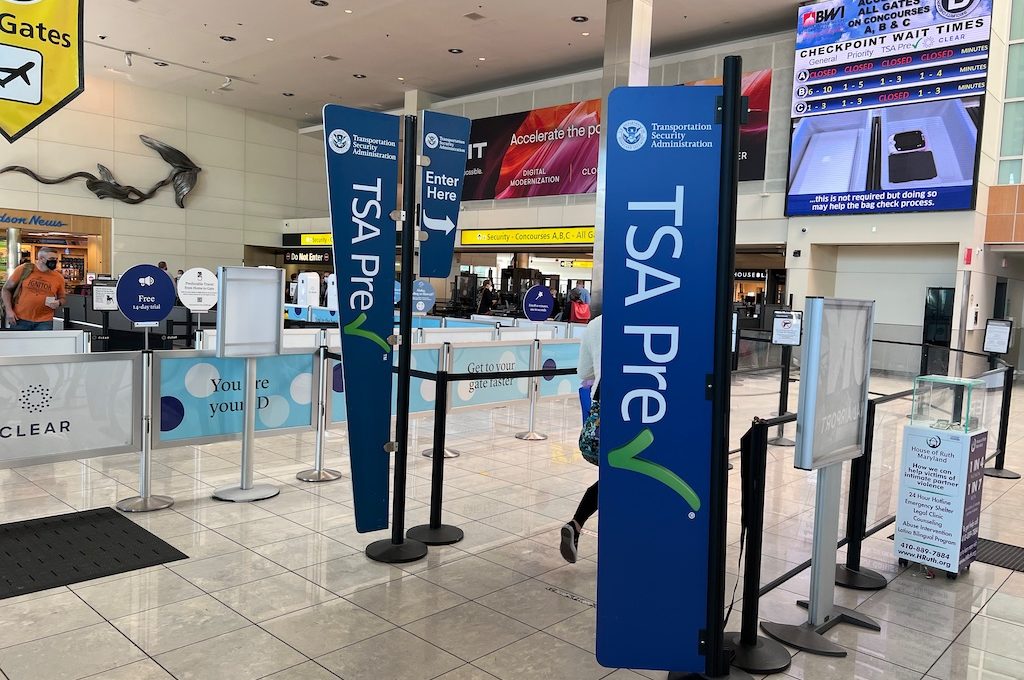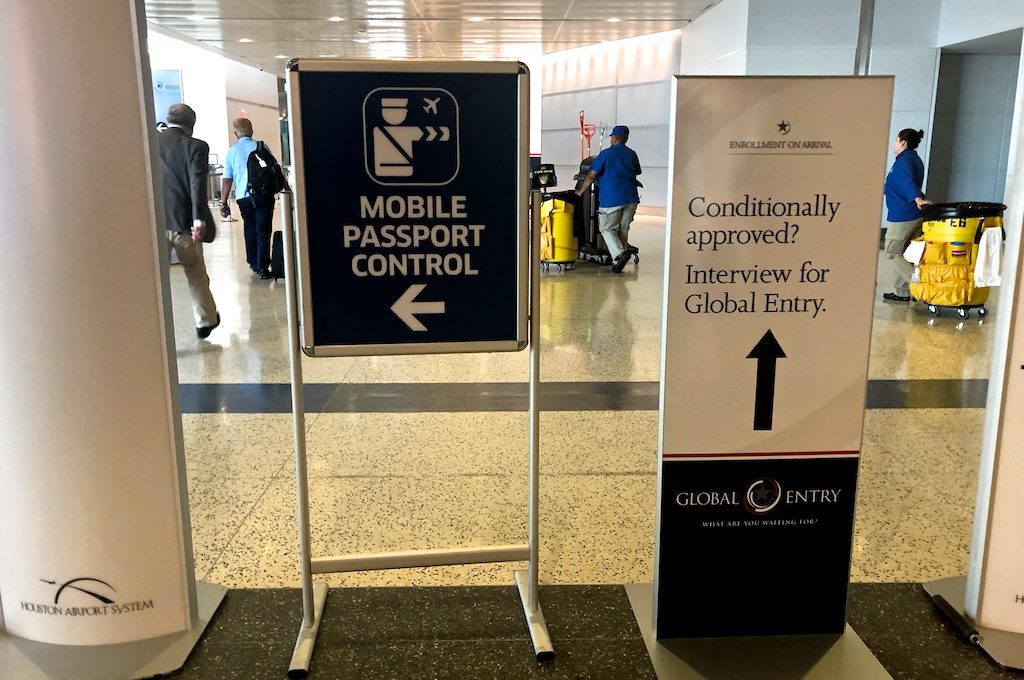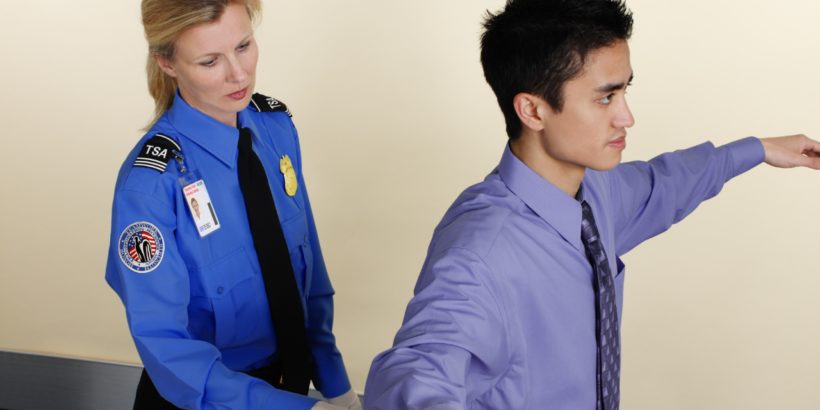A lot of travelers get a little bit nervous when going through airport security. They are afraid of something going wrong and having a badged TSA officer give them trouble as they try to make their way through the airport.
But do these TSA officers have the same level of authority as law-enforcement officers? For example, can they arrest you and can they carry guns on them?
In this article, I will take a look at whether or not TSA officers have arrest authority and can legally carry guns.
The answer to this question might make you feel a little bit more at ease when going through security but there are still some things that might surprise you.
Table of Contents
Do TSA officers have guns?
Most TSA employees are Transportation Security Officers (TSOs) who do not possess arrest powers and are not permitted to carry weapons, including guns. However, there are some employees under the TSA who are allowed to carry guns with them. Keep reading below to find out more.
Tip: Use the free app WalletFlo to help you travel the world for free by finding the best travel credit cards and promotions!
TSA Overview
The Transportation Security Administration (TSA) is an agency of the DHS with a mission to “protect the nation’s transportation systems to ensure freedom of movement for people and commerce.”
The agency, which now has over 54,000 employees, came into existence following the 9/11 attacks with the goal of improving airport security procedures and centralizing air travel security under one agency.
While TSA is most commonly associated with air travel, the agency also develops policies to help protect the U.S. highways, railroads, buses, mass transit systems, ports, and pipelines.
Although most people think of TSA employees as coming in one universal form, there actually are several different types of TSA employees.
Most of these employees do not have arrest powers or permission to possess firearms but that is not always the case….
Below, I’ll give you a breakdown of some of the TSA departments and explain which ones may have authority to carry guns and arrest people.

TSOs
Most TSA employees are Transportation Security Officers (TSOs).
TSO’s are those officers that greet you (with varying levels of friendliness) at airport security checkpoints and usher you through to those wonderful full body scanners.
When people think of TSA officers, TSO’s are usually what they are thinking of.
While most of the time they are concerned with facilitating the standard security screening process, some TSOs may have additional responsibilities.
For example, some TSOs are also Behavior Detection Officers (BDOs).
These are TSA agents tasked with observing passengers as they go through security checkpoints, looking for certain types of behaviors that might indicate the person is up to no good.
It’s important to note that TSO’s do not carry weapons, are not allowed to use force, and they also lack the authority to arrest individuals.
So the vast majority of TSA employees cannot lawfully carry guns.
Federal Air Marshalls
The Federal Air Marshal Service is the law enforcement arm of the TSA.
These are TSA employees who usually work undercover and are the TSA personell known for carrying guns on them.
In order to be a Federal Air Marshal, you have to have exceptional marksman abilities which makes sense since firing a gun in a plane is not exactly low-risk.
Federal Air Marshals also need to be well versed in close quarter combat since they may be tasked with disarming and disabling threats.
These agents are adept at blending into the crowd so in a lot of instances it could be very difficult to point them out. However, if you know what to look for sometimes it’s not so hard to spot them.
Federal Air Marshals are not on every plane since that would take an incredible amount of resources. Instead, they could be assigned to flights randomly or based on a destination or suspected threat level.
For example, if someone is on a government watch list and flying on a plane, there’s a good chance at least one Air Marshal will be on board.
Air Marshals are known to closely observe passengers and travelers in airports, looking for odd behaviors and movements.
The types of behavior they could be looking for are almost infinite but could include things like an abrupt change in direction when walking through the airport, constant fidgeting, changing clothes, etc.
Basically, anything remotely suspicious.
Related to the Air Marshals are the Federal Flight Deck Officers (FFDOs). Many people have no idea about these volunteer officers but it’s actually a pretty interesting program.
These are mostly pilots who are former military and they are officially deputized by the TSA.
Their jurisdiction is limited to the flight deck but these are pilots who are allowed to carry a weapon and know how to use it.
Like the Air Marshals, they undergo similar training focusing on constitutional law, marksmanship, physical fitness, behavioral observation, defensive tactics, and emergency medical assistance.
One of the big differences is that these are just volunteers and don’t earn extra wages for taking on this additional responsibility.
Related: Do Airline Pilots Carry Guns in the Cockpit?
TSA Canine handlers
If you’ve traveled enough you’ve certainly seen canine handlers and the airport.
These are people who take care of the dogs that go around patrolling for explosives and other dangerous items. Some dogs might be sniffing out drugs but typically it is the bombs and explosives that are a primary concern in the US.
These canine teams are made up of TSA inspectors and local law-enforcement officers.
Law enforcement officers make up roughly 65 percent and the other 35 percent are transportation security inspectors.
This means that most of these canine handlers should have arrest powers and also likely have guns.
You can usually tell the TSA canine agents apart because they wear khaki pants and the law enforcement officers are usually dressed in all black or something else. I believe the TSA agents who handle the canines are also unarmed.
Visible Intermodal Protection and Response (VIPR)
Visible Intermodal Protection and Response (VIPR) is a program designed to “augment the security of any mode of transportation at any location within the United States.”
Officers enrolled in this program are part of the TSA’s Office of Law Enforcement/Federal Air Marshal Service, which allows some of them to have arrest powers and to carry weapons.
While you could find members of VIPR at an airport, you wont typically find them at airports.
Instead, you would usually find these at pretty much any other place of transportation including: railroad stations, bus stations, ferries, car tunnels, ports, subways, truck weigh stations, and rest areas.
Customs
United States Customs and Border Protection (CBP) is the largest federal law enforcement agency of the United States Department of Homeland Security.
They are charged with “keeping terrorists and their weapons out of the U.S. while facilitating lawful international travel and trade.“
CBP officers do have arrest powers and also are allowed to carry weapons. They are distinct from TSA but sometimes there is overlap between personnel in certain types of departments (e.g., VIPR).
Related: Is Customs the Same as TSA? (Key Differences)

Should TSA officers have guns?
In 2013, TSA agent Gerardo Hernandez was gunned down at LAX airport. He was the first TSA officer killed in the line of duty in the agency’s history.
This raised the question of whether or not TSA agents (TSOs) should have guns while on duty.
Opponents point to the fact that there are over 40,000 TSO’s and that arming all of them with guns would inevitably lead to a lot of mishaps and unnecessary deaths.
They question the training that TSOs would receive with respect to using a weapon and how qualified those agents would be to fire in an airport with hundreds of bystanders often in close proximity.
It’s very difficult to disagree with these concerns.
A more practical solution might be creating a smaller unit of law enforcement within the TSA that trains TSO agents to use firearms. Essentially, these would be similar to the Federal Air Marshals except their domain would be the security checkpoint stations.
However, opponents think this is still “mission creep” and think that there are better solutions. For example, there could be a more reliable presence from law enforcement officers in airports, panic buttons installed for TSA agents, etc.
Unfortunately, we don’t typically see major changes in security procedures until after some type of attack or attempted attack. So my guess would be that until we experience another incident at airport security, things will probably remain the same.
Bringing firearms through the airport
If you are interested in legally transporting a firearm yourself then you should be well aware of the TSA firearm rules.
Basically, under no circumstances can you ever bring a firearm through airport security as a carry-on.
However, you are allowed to bring certain types of firearms in your checked baggage.
When doing so, you need to make sure that you comply with some of the rules like making sure the weapon is not loaded and having the weapon in a secured luggage bag.
We’ve put together an in-depth guide on traveling with firearms and you can check it out here.
Final word
Most TSA employees are TSO’s who do not have arrest powers and do not carry weapons of any kind, including guns.
However, there are some individuals under the TSA such as Federal Air Marshals who do have law enforcement powers and are allowed to carry guns through the airport and even on planes.
In addition to them, some pilots may also be armed if they are in the FFDO program.
Daniel Gillaspia is the Founder of UponArriving.com and the credit card app, WalletFlo. He is a former attorney turned travel expert covering destinations along with TSA, airline, and hotel policies. Since 2014, his content has been featured in publications such as National Geographic, Smithsonian Magazine, and CNBC. Read my bio.

